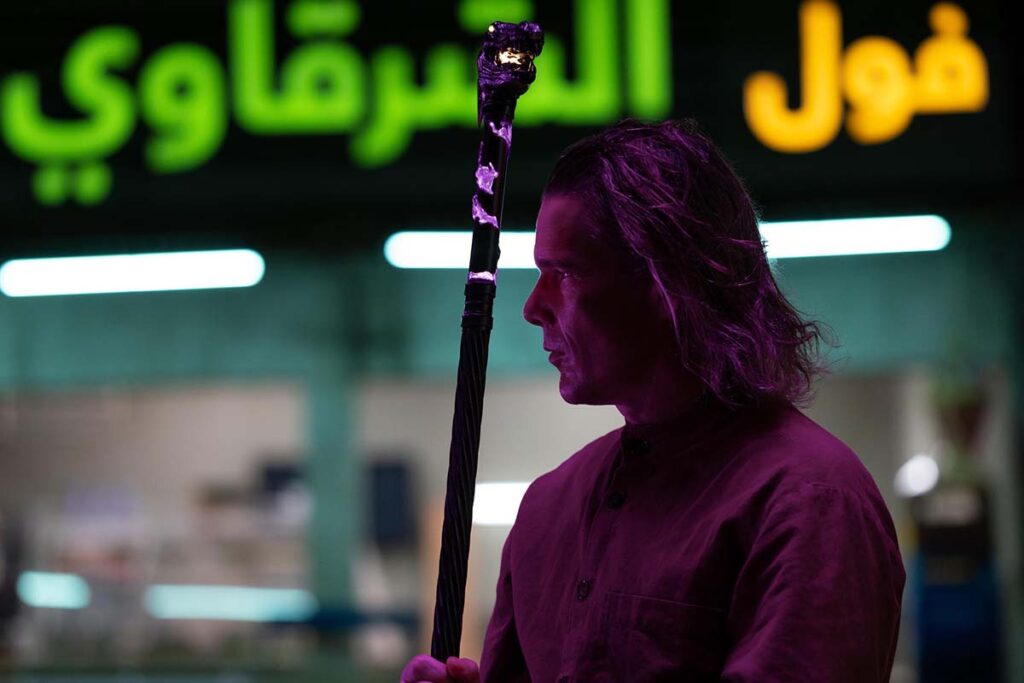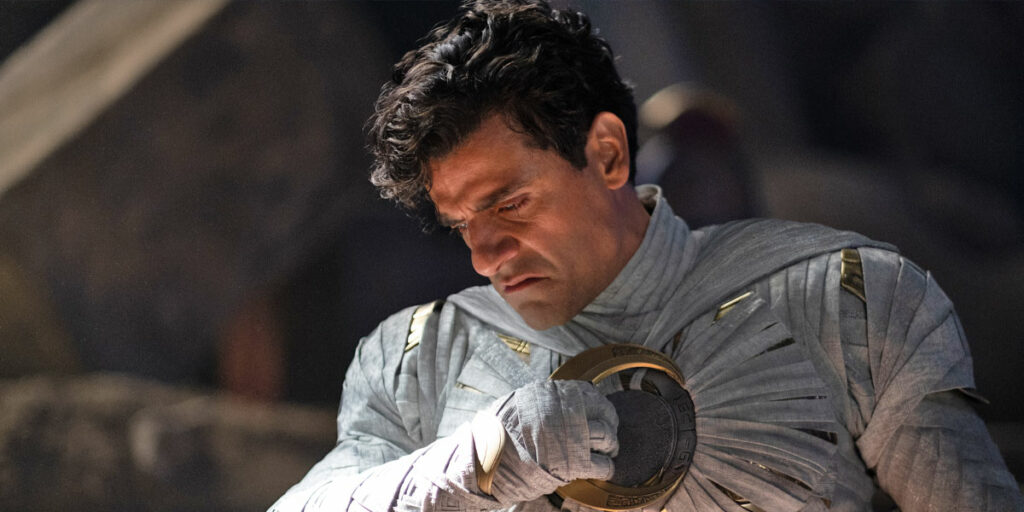The series finale of Moon Knight is messy but fun, and feels like the sum of its parts as much as it does a really exciting glimpse at what’s to come.
This review contains spoilers for Episode 6 of Moon Knight (‘Gods and Monsters’).
And just like that, it’s the series finale of Moon Knight. So far the latest MCU series has been unafraid to take risks, been content to leave questions unanswered, crammed in some dense theology, and prioritised the most interesting aspects of character over action-adventure style superhero plot shenanigans when the story called for it. The final episode continues in this fine tradition, cramming a lot into a runtime of only 43 minutes and making bold choices, developing characters in interesting ways, and ending on a note that alters the Marc/Steven dynamic completely.
After last week’s walk through of Marc and Steven’s (Oscar Isaac and Oscar Isaac ) memories, childhood trauma and relationship timeline, this week brings us back to ‘reality’. Harrow (Ethan Hawke) has retrieved Ammit’s statuette from Marc/Steven’s lifeless body, with Layla (May Calamawy) watching helplessly from the shadows, and he ominously asks: ‘who wants to heal the world?’ before releasing her upon Cairo and, in turn, the world. But Marc doesn’t give up that easily. With Tawaret’s (Antonia Salib) help, he’s able to guide Layla into freeing Khonshu (F. Murray Abraham) from stone while he frees Steven from sand, and together they can escape the underworld and stop Harrow, once and for all.
The main worry heading in to this episode was whether it’d be enough to satisfyingly conclude what has been an intense, surprising and really unexpected show so far. And the answer is, for the most part, yes. But even the unsatisfying bits feel like deliberate, audacious decisions designed specifically to be in keeping with the show itself. It’s messy and complicated and confusing, just like Marc and Steven. But it’s also fun, poignant and a bit bonkers, just like Marc and Steven. It’s a finale that feels like the sum of its parts as much as it does a really exciting glimpse at the future.
And speaking of the future, we have to address the elephant – not the massive crocodile lady just yet – in the room: the end credits sting and the introduction of Jake Lockley (Oscar Isaac). The hints have been subtle but present throughout the entire show: Marc and Steven sharing fragments of missing time, the rattling tomb in their imaginary psych ward, Harrow ominously mentioning (he does that a lot) Marc’s damaged mind, so a third ‘alter’ turning up isn’t exactly surprising. Nor is it surprising that the reveal was kept until the last second. The finale had so much going on that adding Jake into the already established dynamic between Marc and Steven would have muddled already muddy waters a bit too much, and an already crowded narrative could have been pushed to its breaking point. Maybe it’s a little cheap to toss in such a significant character development right in the episode’s closing seconds, or maybe it’s the ultimate tease for more, but either way it certainly alters (if you’ll forgive the word choice) the progression of Marc and Steven going forward.

Aside from the Spanish-speaking, limo-driving, gun toting Jake, there was a lot happening in this episode. Harrow freeing Ammit, Layla freeing Khonshu (but turning down his avatar offer), Tawaret helping Layla (who doesn’t turn down her avatar offer) and Harrow fighting Marc and Steven (who finally work together as ‘Moon Knight’). And this is in the space of, maybe, 30 minutes. It’s intense. It zips along at such a pace that it’s actually quite difficult to keep track of what exactly is going on at any one time. And while the fight scenes are the most impressive and exciting of the series so far, they don’t all feel essential. As Marc/Steven fight Harrow in a battle of the avatars, having a CGI Ammit (the aforementioned giant crocodile lady, voiced by Saba Mubarak) fight a CGI Khonshu (in all his pigeon demon glory) felt like an unnecessary addition. The fight between Marc, Steven and Harrow is as much theological as it is physical, we don’t need to see the Gods at it too to understand the significance. By having it contained to just those three characters would have brought the show right back to where it shined in previous episodes; it would have felt much more grounded in character, rather than in a wider superhero and mythological context.
Because it has been in its characters that Moon Knight has worked best. Isaac’s performance as Marc is so nuanced, as is his performance as Steven, and they both feel like whole characters but also simultaneously as a part of each other. One complements the other, and Isaac’s masterful acting choices made Marc and Steven equally as endearing, emotionally connecting and engaging by the end of this episode, and of the series as a whole. Admittedly, such a commanding performance – and, indeed, such focus on Marc and Steven’s dynamic – meant that certain aspects were left a little short-shifted at times. Mainly Ethan Hawke. His creepy zealot turned a little rote megalomaniac by the end, and the most compelling moments for Harrow became those in the is-it-real/is-it-fake doctor’s office. The tete-a-tetes between him and Steven in the first episode, and then between him and Marc in the second, were a really interesting way of keeping the relationship between ‘hero’ and ‘villain’ feeling personal and significant on a level deeper than simply saving the world. It’s a shame that got lost as the series progressed.
Layla’s transformation into (and this is lifted straight from the comics, as she is never addressed as such in the show itself) the Scarlet Scarab, however, meant that May Calaway got more to do as the series progressed. It added a freshness to the show as well as a significant female presence; she got her ‘superhero’ moment (quite reminiscent of Wonder Woman) as she saved a little girl in the midst of her fight, and it adds a new dimension to her relationship with Marc. Enough can’t be said for the importance of diverse superheroes, and so by having her not only be a female superhero but an Egyptian one, it’s a further step forward for a studio that has, admittedly, been slower on the uptake. Let’s hope she appears again soon.
For now though, the future of Moon Knight is – if you’ll forgive another pun – up in the air. There’s still no confirmed news about a second series, but for all the confidence Marvel has clearly had in this show, for all they’ve leant into its boldness, its exploration of mental health and its willingness to lean into its own ridiculousness and humour at times, it feels like it’d be a definite shame not to explore Marc and Steven (presumably we’ll need to add ‘and Jake’, at some point) and their dynamic, powers and aim to ‘save the world’ further. But, to cap off this series of reviews, the finale episode ticks a lot of the right boxes. It feels in keeping with the show as a whole in that it resolved some of its unanswered questions, but was perfectly content in making those answers ambiguous. It’s a bold finale for a bold series, and a testament to a studio and creative team willing to take risks.
Laters, gators!
Moon Knight ‘s series finale is now available to watch on Disney Plus.

